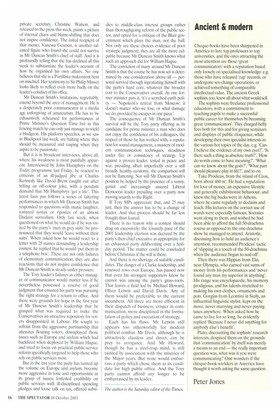Ancient & modern
Cheque-books have been sharpened in America to lure top professors to top universities, and the ones attracting the most attention are those 'great communicators' with a reputation based only loosely on specialised knowledge: e.g. those who have released 'rap' records, or undergone sex-change operations, or achieved something of comparable intellectual value. The ancient Greek sophists, too, knew all about what would sell.
The sophists were freelance professional educators, with a commitment to teaching pupils to make a successful public career for themselves by becoming great 'communicators'. They charged hefty fees both for this and for giving seminars and displays of public eloquence, while developing their own specialist interests in the various hot topics of the day, e.g. 'Can I believe the evidence of my own eyes?', 'Is there such a thing as absolute truth?', 'How do words come to have meaning?', 'What can we know about the gods?', 'What part should pleasure play in life?', and so on.
Take Prodicus, from the island of Ceos, born about 460 BC. He had a reputation for love of money, an expensive lifestyle and generally exhibitionist behaviour, and knew the big bucks were in Athens, where he came regularly to declaim and teach. His lectures on the correct use of words were especially famous. Socrates went along to them, and wished he had been able to afford the full 50-drachma course as opposed to the one-drachma show he managed to attend. Aristotle, discussing how to hold an audience's attention, recommended Prodicus' tactic of 'slipping in a touch of the 50-drachmas when the audience began to nod off.
Then there was Hippias from Elis, near Olympia, who earned vast sums of money from his performances and 'never found any man my superior in anything'. His range was encyclopaedic, his memory prodigious, and his talents stretched to making his own clothes, ornaments and pots. Gorgias from Leontini in Sicily, an influential linguistic stylist, kept on the move, never marrying and never paying taxes anywhere. When asked how he came to live for so long, he evidently replied 'Because I never did anything for anybody else's benefit'.
Plato, discounting the sophists' research interests, despised them on the grounds that 'communication' by itself was merely a means to an end — the really important question was, what was it you were communicating? One wonders if the cheque-book wielders in America have thought it worth asking the same question.


































































































 Previous page
Previous page